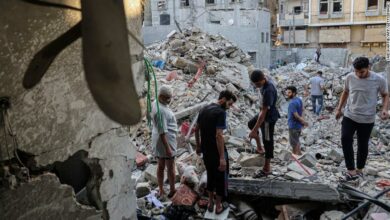According to human rights organizations, thousands of political activists remain in detention with evidence that they’re being tortured. Experts say that the army’s handling of the political detainees may cost it the trust of the people.
Amnesty International released a statement on Thursday announcing it has evidence that political detainees are being tortured and urging the army to treat them humanely.
“The Egyptian military authorities have committed publicly to creating a climate of freedom and democracy after so many years of state repression. Now they must match their words with direct and immediate action,” said Malcolm Smart, Amnesty International’s director for the Middle East and North Africa.
Ahmed Ragheb, head of the Hisham Mubarak Law Center, also says that since the security gap created when police retreated on 28 January, the treatment of political prisoners has been worse than before and some prisoners have reported being tortured.
Even though Prime Minister Ahmed Shafiq announced last week that he will release all political detainees including Muslim Brotherhood members, only 34 were released.
A group of political detainees belonging to Islamic groups were let out of prison during the security failures that occurred in the first week of the revolution during what some say was the intentional release of thousands of prisoners.
Ragheb said that there is no legal justification for the delay of the detainees’ release. “They are detained with no charge, they should either be released or transferred to trial,” he said.
Emag Gad, political analyst at Al Ahram Center for Political and Strategic Studies says that, while investigations of cases to rule out terrorism charges will take time, political detainees who are facing no criminal charges should be released immediately. “Belonging to the Muslims Brotherhood is not a crime, neither is calling for protests,” he said.
Human rights activists including Ragheb say they are not optimistic that promises to release detainees will be delivered.
Ragheb says that, in an alarming development, a group of political detainees were transferred to the military prosecution on Thursday to face charges.
Gad is calling on Human Rights Groups to put more pressure on the army to release the detainees.
Both men warn of the implications of delaying the release of the political prisoners any further.
Gamal Eid, head of the Arabic Network for human rights information says that the army’s handling of the situation is negatively affecting its image.
“We are slowly losing our trust in the army, we are starting to feel that only the faces have changed while the oppressive regime that doesn’t respect our liberties is still in place," he said.
Eid says that the organization hasn’t been able to collect any information about the detainees or to reach any army officials to demand their release. He demands that law be applied to force the military to reveal the locations of the detainees and what charges they face.
Under the state of emergency, in place since 1981 following the assassination of President Anwar El Sadat, thousands of political activists have been detained without being charged or receiving trial. In the state's efforts to repress Islamist groups such as the Islamic Jihad Movement and The Muslim Brotherhood, members were often arrested arbitrarily and systematically targeted following terrorist attacks.
Following the mass arrests of Islamists in the wake of Sadat's assassination, over 1000 young men were arrested and referred to a military trial in the 1990s for belonging to a group accused of receiving terrorist training in Afghanistan. The bomb attack in North Sinai in 2005, which killed 34 people and injured 100, led to a new wave of emergency law detentions. While the authorities were after nine perpetrators, 2500 people were detained as suspects. Tens of Islamists were also arrested following the Alexandria church bombing on New Year’s Eve.
Many Islamic detainees remained imprisoned despite being acquitted, while others were held in prison decades after finishing their sentences. Jihad leaders Abboud El Zomor and Tarek El Zomor have been in jail for charges relating to the assassination of late President Anwar El Sadat since 1981 even though their ten year sentences ended in 2001.
Nezar Ghorab, El Zomor’s lawyer, says that he has pursued all the legal procedures possible to free the detainees and the regime has not responded.
Another detainee from Al Jihad, Yehia Khallafalah, was sentenced to six years in 1993 and has been in jail for 24 years.
Sally Samy from the Cairo Institute for Human Rights Studies says that the regime takes advantage of the vagueness of the legal definition of “terrorism” to imprison Islamists and Salafists under the emergency law.
Ghorab says that keeping political detainees incarcerated will hinder the development of Egypt after the revolution. “How can a democratic country be built while some people are deprived of their basic right for freedom?” asks Ghorab.
Ghorab warns that if the army and the new regime continue Mubarak regime practices of using terrorism charges to crack down on Islamists, they will provoke the people to start another uprising.
Families of 300 political detainees already demonstrated in front of the Supreme Court on Wednesday, demanding their release.
A group of young activists submitted a list of approximately 50 political detainees to the army’s high council during a meeting Monday. According to youth leader Nasser Abdel Hamid, the activists were promised that their compatriots would be released shortly.




